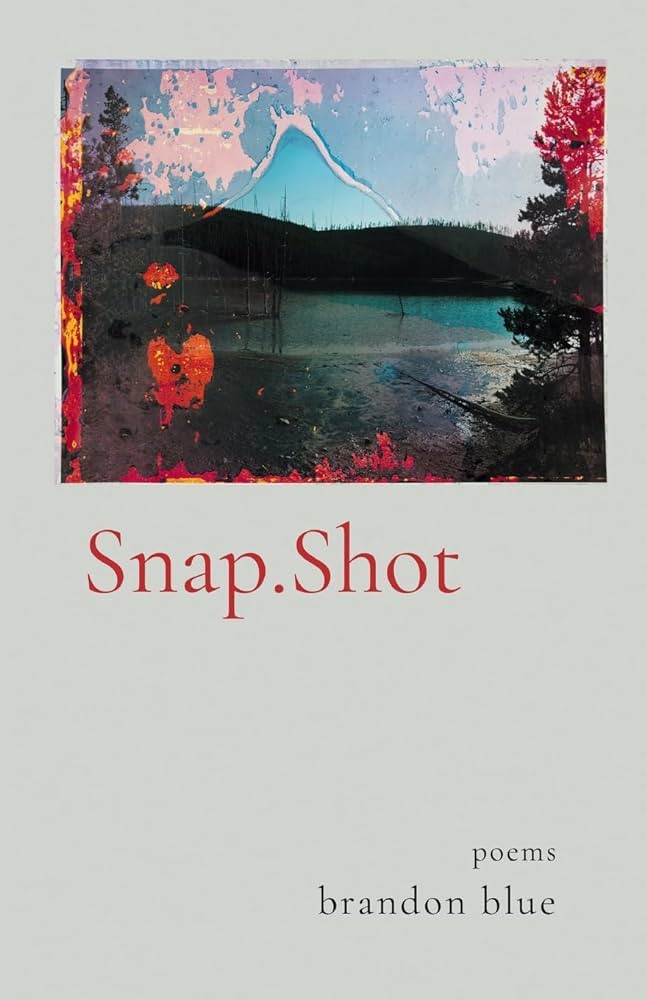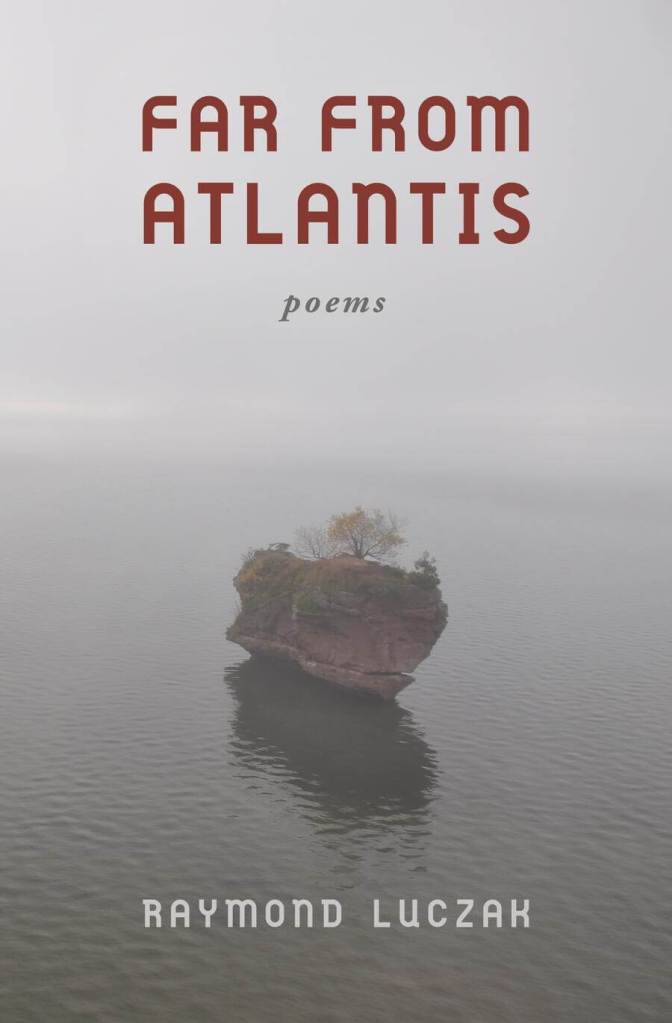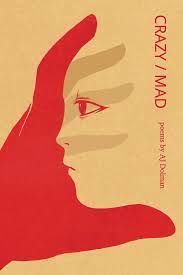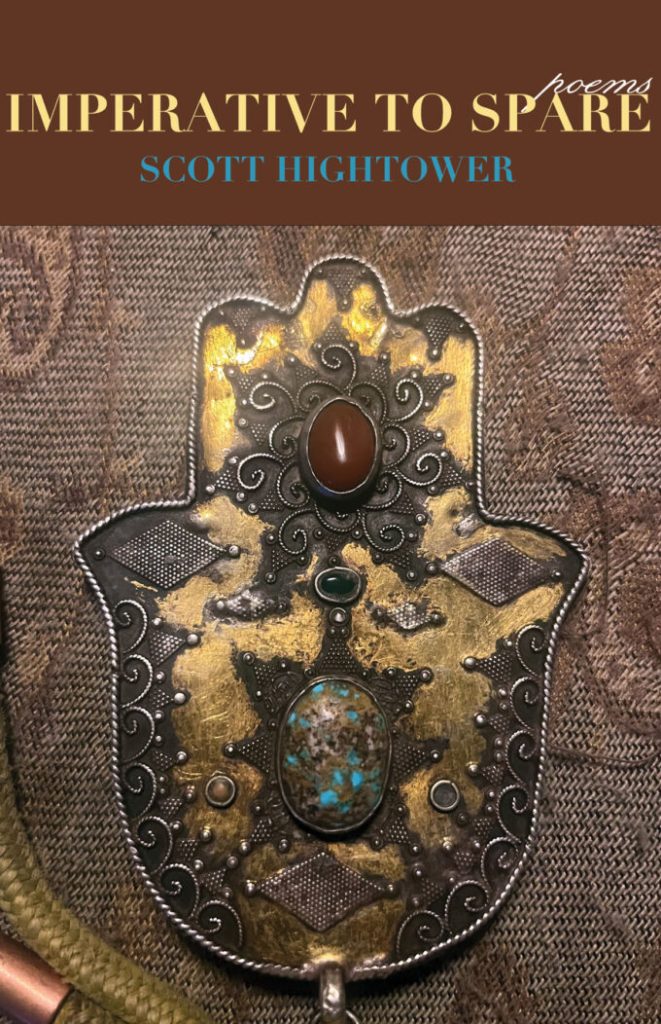It’s April again, meaning National Poetry Month, and I thought I’d take the opportunity to present four volumes to celebrate the form and its artistry. We have some wonderful poets with unique styles and fresh, exciting images, so let’s get right to it.
Snap.Shot – Brandon Blue (Finishing Line Press)

Buy from:
Ekphrasis, or writing about the art of others, is a revelatory weapon in the poet’s arsenal–from the subject to the homage, it may be the most personal of poetry because it not only tests the poet’s artistry but reveals something about their composition of their artistic tastes as well. It’s no surprise, then, that such a visual poet as Brandon Blue chooses photographs or paintings as his jumping off points. What is surprising is how sell Blue captures the gist of these images but echoes it. In two perfect examples near the front of the book, Blue uses the unsettling, off-kilter Bob Ross-ness of Matthew Brandt’s Rainbow Lake, WY A23 and turns it into the tense masquerade of “Vacation Facade,” then he resets the peaceful slumber of Peregrine Honig’s The Twin Fawns as part of a juxtapositioning with raucous clubbing in “The Twin Fawns.” Both illustrate his approach perfectly. However, the images he conjures separate from the inspiration of others are just as satisfying. From the sensuality of “Tinted” to the clever “Hiccups,” which is more about circumcision and shame than anything else, Blue proves himself a poet to be reckoned with whether he’s inspired by either his external or internal eye.
Far From Atlantis – Raymond Luczak (Gallaudet University Press)
Buy from:

Raymond Luczak is no stranger to ekphrasis either, but there’s not much Luczak hasn’t written. From poetry to fiction to non-fiction to dramaturgy, Luczak has dabbled in many forms. His most recent book of poetry, Far From Atlantis, finds the common ground between the mythical Atlantis and the very real upper peninsula of Michigan (or “yoop” as we like to call it) where Luczak was raised. His ekphrastic jumping off points are Seventies TV shows like Buck Rogers in the 25th Century and The Six Million Dollar Man, among others, but like Brandon Blue, those exercises are only a part of his gift. Luczak has a Whitmanesque love of nature that ties Atlantis to Ironwood and makes the whole volume work, as do his occasional references to his Deafness. I always enjoy new Raymond Luczak, and his Ironwood material is particularly important to me since I grew up in Michigan as well and made many trips up north. “Standing Before Lake Superior” and “Currents of Ironwood” are particularly fine examples of this, but anywhere you land in this collection you’ll find something worthwhile.
Crazy/Mad – AJ Dolman (Gordon Hill Press)

Buy from:
A glance at the Table of Contents in AJ Dolman’s skittery, jittery Crazy/Mad shows absolutely no ekphrasis anywhere. But you’ll recognize the territory quickly enough. Its three sections are “Hysteria,” “Neurosis,” and “Melancholia,” and the poem titles read like a compendium of mental disturbances, syndromes, and anomalies. It’s very sharp work, poking holes in theories and slicing away old methodologies. Titles like “Critical race theorist,” “Antisocial behavior,” and “Murderous tendencies” are particularly pointed, the latter inspired by Andrea Yates, a mother who murdered her children. Other favorites for me are “Delusions of grandeur,” the poignant ode to a convenience store worker “Self-harm,” and “Difficulty concentrating” (with the wonderful opening line, “I lost track of what books I read this pandemic”), but like the Luczak volume, anywhere you put yourself down here, you’ll find a thought or an outlook or jab that’s particularly relevant. This is the first work I’ve read of theirs, and I’ll certainly be waiting for the next.
Imperative to Spare – Scott Hightower (Rebel Satori Press)
Buy from:

No devastation I know is more complete than the death of a spouse, and only those who have experienced it can truly know. I greatly admire Hightower’s bravery, because this collection of poetry addresses the matter with such profundity and frankness it leaves me breathless. Titles such as “It Would Have Been My Preference To Have Gone Before You,” “Long Hard Slag,” and “On My Own” speak for themselves, but as plainspoken as his grief is, these pieces at times have a subtle positivism that enables the reader to work through the process in the same way the author does. By the time we reach the fifth section, “Renaissance,” the poems are hopeful, regretful, and just a touch bittersweet. But the wisdom, the way the survivor alchemizes grief into growth–as those of us who survive must do–is evident. Imperative to Spare is, for me at least, a harrowing read in the beginning that reminds me of some personally dark times but also reminds me in places of my path through them and the routes I didn’t take.
So, there you have four very different voices with four very different volumes. But don’t just buy poetry in April–it’s a gift for any occasion, not only for someone else but for yourself as well.
JW
© 2024 Jerry L. Wheeler
